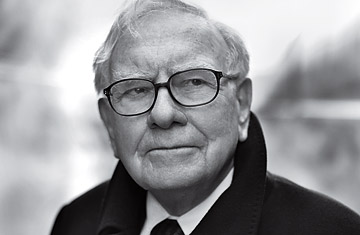
(8 of 9)
In a speech delivered at the famous Allen & Co. Sun Valley Conference in 1999, at the height of the Internet bubble, Buffett succinctly explained the virtues of being a Luddite: "[The automobile was] the most important invention, probably, of the first half of the 20th century. It had an enormous impact on people's lives. If you had seen at the time of the first cars how this country would develop in connection with autos, you would have said, 'This is the place I must be.' But of the 2,000 companies, as of a few years ago, only three car companies survived. So autos had an enormous impact on America but the opposite direction on investors."
SHARED SACRIFICE
Buffett's investments may not be snazzy, but they've nearly always been smart. While the value of Berkshire Hathaway is still somewhat smaller than before the financial crisis, net earnings are higher, and many of the company's largest businesses are on track for a record year. Forty-seven years ago, one share of Berkshire Hathaway was worth $19. Today a single share is worth $116,914.
I ask Buffett if, when he started, his aim was to be the richest man in the world. "I knew I wanted to make a lot of money. But that's because I knew I wanted to be independent. That was very important to me. The money itself is all going to charity," says Buffett, who in 2006 pledged 99% of his personal wealth to charity, with the bulk going to the Bill & Melinda Gates Foundation. "I'm really just a steward of it for now." Supply siders like Arthur Laffer have tried to paint him as a hypocrite for his giving. A recent Laffer opinion piece in the Wall Street Journal bashed Buffett for, among other things, shielded income like unrealized capital gains (taxed at 0%) and charitable contributions (which are tax-deductible). "Well, I had a net unrealized loss last year," notes Buffett. "But if Arthur has a plan for how he wants to tax unrealized gains, I'd love to hear it. It's an interesting thing for a Republican to put forward!"
When Buffett isn't giving, he's teaching. Many of the rich and famous seek his counsel about business and philanthropy. Recent visitors include Fiat scion John Elkann and the Baroness de Rothschild, whom Buffett took to Piccolo's, the modest family-owned Italian steak house where we sit eating dinner. "She loved it here," Buffett says. "She had a root-beer float for dessert."
Just as important to Buffett as his philanthropy is his agenda for America. The independence afforded by great, leverage-free wealth has allowed him to speak out politically in recent months, something the conflict-averse financier has avoided most of his life. When asked about any of the very few controversial events in his life, Buffett tends toward deflection. The ignominious fall from grace of former Berkshire golden boy David Sokol (who resigned after revealing that he bought stock in a company before proposing it as a takeover target) is something he "just doesn't understand." He gives the ratings agency Moody's and the investment bank Goldman Sachs, both of which he owns stakes in, a pass for dubious behavior during the financial crisis, as they were both a part of "a mass delusion. Everyone felt houses couldn't go down."
